‘Wenesh Niin’: Laying the foundation of the Spirit Within
3 December 2024, 11:00am – 12:00pm
Summary
Summary to come
Recording
Resources
Summary
Summary to come
Recording
Resources
Summary
VicTESOL were very pleased to have Dr Melanie Baak present the key note address for the 2024 symposium, which set the scene for the rest of the symposium events. Melanie presented on a significant body of research looking at how schools foster resilience for students from refugee backgrounds. She presented key learnings and information that resonated with the experiences of attendees. Melanie’s insights were very thought provoking, which generated lively discussions between attendees in break out room sessions and led nicely to the next programmed event – hearing the experiences of young people of refugee backgrounds in Victorian schools.
Recording
Resources
Summary
In this session, Lindsey Hogg, Professional Learning Officer, and Allison Greene, Lead and GROWTH Coach, from Foundation House Schools Support Program presented a session on Foundation House’s Recovery Model. This session unpacked practical and developmentally appropriate support strategies for learners’ impacted by trauma. The session emphasized the importance of trauma informed practice when working with learners from refugee or refugee like background and the importance of creating safe and culturally responsive learning environments that empower and promote the establishment of safe and nurturing relationships.
For More information of Foundation House Recovery Model or Refugee Education Support Program or wellbeing services for education sites contact: (03) 9389 8900
School support: https://foundationhouse.org.au/specialised-programs/schools/
Referral Support: https://foundationhouse.org.au/for-clients/make-a-referral/
Recording
Recording to come
Resources used in the session
Other Resources
Summary
This panel was held in response to symposium keynote address by Melanie Baak, Refugee education in Australia: what helps, what hinders and what needs to change. The Pannel was facilitated by Victesol committee member, April Edwards. Pannel members from a range of settings including school leadership and refugee support services discuss their experiences of working with students from a refugee background. This included the teaching of English as Additional Language, creating welcoming and inclusive social environments, supporting pathways and supporting wellbeing. The Pannel discussed ways schools can be culturally responsive and importance of supporting wellbeing and being aware of challenges faced within the settlement process and establishment of new lives and identities.
Panelists:
Sarah Cunningham has been employed with CatholicCare Victoria since 2020, coordinating a Job Readiness Program for refugee youth and their mothers in Geelong’s Northern Suburbs.
Debra Gibson is the Principal of Doveton College – a vibrant learning community comprising an Early Learning Centre for children 0-5 years of age, school for Foundation to Year 9 and a range of adult learning classes.
Christine Bakopanos is a Counsellor-Advocate Senior Practitioner at The Victorian Foundation for Survivors of Torture- known as Foundation House. Foundation House provides a range of services to people from refugee and asylum-seeker backgrounds who have survived torture or war related trauma.
Houda El Kheir has been working as a Multicultural Education Aide at Meadows Primary School, in Melbourne’s north for the last 5 years. She works closely with teachers, the principal and the wellbeing team in supporting newly arrived and refugee families to navigate the Australian schooling system.
Recording
Summary
Summary to come
Resources
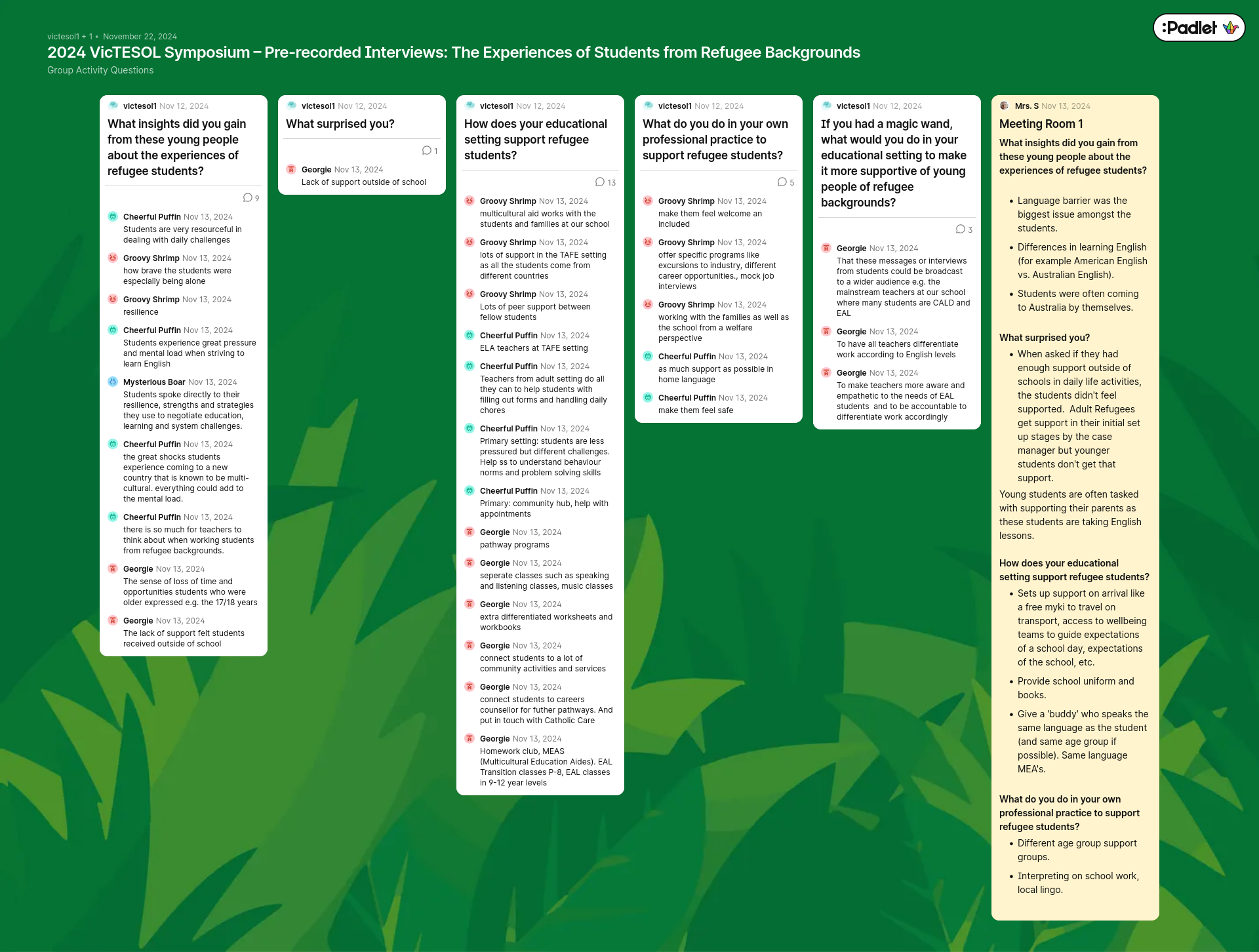
Summary
On October 17, VicTESOL hosted an engaging educator’s tour at the Immigration Museum, offering both professional development and an opportunity to explore some of the museum’s latest exhibitions. The evening began with a chance for participants to connect over a selection of tea, coffee and delicious food platters, providing a relaxed atmosphere to chat and network.
Immigration Museum educator Gurmeet Kaur then presented some of the updated resources and educational programs for students visiting the museum. Her insights gave attendees fresh ideas on how to incorporate the museum’s diverse resources and themes into classroom learning. Following this, we heard from Dr. Katrina Tour and A/P Melissa Barnes who officially launched the Voices in TESOL podcast series. The podcast promises to be an invaluable resource for educators in the TESOL community and was a highlight of the evening!
After the presentations, educators had the chance to explore the museum’s exhibitions. The Joy exhibit was a standout, featuring vibrant artworks by Australian artists and interactive elements, including a playful oversized soft bunny and a “Share Your Joy” wall where visitors can reflect on what sparks joy in their own lives. The Videoland exhibit, filled with 90s nostalgia, also provided a fun walk down memory lane! Attendees agreed that the event was a great success and are looking forward to incorporating some of the ideas back in their educational settings.
Resources
Photos from the session
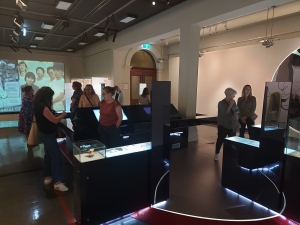
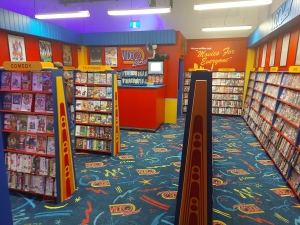
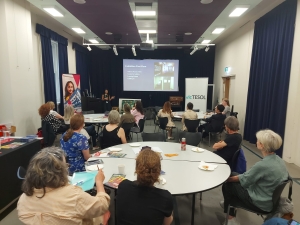
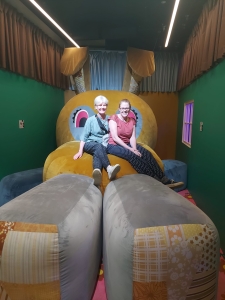
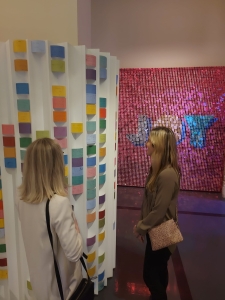


Summary
In this online presentation, Dr Lilly Yazdanpanah discussed the importance of metacognitive thinking for both EAL teachers and students. Dr Yazdanpanah provided participants with a clear definition of both cognition and metacognition and spoke of the benefits to teachers who make space in their teaching, to engage in the reflective practice of systemically considering how their students best learn. Through metacognitive thinking, teachers can become more intentional in their practice, and foster a deeper understanding of their students’ learning experiences.
Additionally, Dr Yazdanpanah emphasized the benefits of teaching metacognitive strategies to students and modelling reflective thinking in the classroom. By demonstrating how to think about their own learning, teachers can guide students to plan for, monitor and evaluate their learning. During the session, practical examples were shared to illustrate these strategies in action. Through explicitly supporting EAL students to consider the ‘what’, ‘how’, ‘why’ and ‘when’ of their learning, Dr Yazdanpanah demonstrated that EAL students can become more empowered learners.
Resources
Summary
On 10 September, we were pleased to have Dr Chris Corbel present the third in his series of webinars for VicTESOL. This webinar focussed on powerful grammatical knowledge for specialist language teachers. Chris first briefly outlined the concept of powerful knowledge. He then explained two types of powerful grammatical knowledge relevant for specialist language teachers:
This session provided lots of grammatical food for thought for both beginner teachers and experienced EAL teachers.
Recording
Resources
Summary
Recording
Summary
1. Defining Wellbeing
Alexandra began by defining wellbeing as encompassing the health of the whole person, including physical, mental, social, and emotional aspects. Wellbeing is strongly linked to happiness and life satisfaction, influenced by our surroundings and actions, and can change over time. It’s important to note that wellbeing is not a one-size-fits-all concept and requires long-term, sustainable solutions adapted to individual needs.
2. Frameworks for Understanding Wellbeing at Work
Alexandra introduced the PERMA framework as a tool to understand and enhance wellbeing at work. The PERMA model includes:
Positive Emotions: Experiences that contribute to overall happiness and resilience.
Engagement: Being fully absorbed in activities that balance challenge and skill use.
Relationships: Developing meaningful connections with others.
Meaning: Having a sense of purpose and feeling that one’s work is valuable.
Achievement: Accomplishing goals and feeling a sense of competence and pride.
3. Benefits of Setting Boundaries for Wellbeing
Setting boundaries is crucial for maintaining wellbeing. Alexandra emphasized that boundaries help individuals manage stress, prevent burnout, and maintain a healthy work-life balance. Boundaries allow educators to say ‘no’ when necessary, ensuring they do not take on more than they can handle and protecting their time and energy for activities that support their wellbeing.
4. Strategies for Self-Care to Enhance Job Satisfaction, Resilience, and Wellbeing
Alexandra discussed various self-care strategies, including:
Physical Wellbeing: Engaging in regular physical activity and ensuring adequate rest and nutrition.
Emotional Wellbeing: Practising self-compassion, mindfulness, and seeking support when needed.
Professional Wellbeing: Setting realistic goals, celebrating achievements, and continuing professional development.
Social Wellbeing: Building strong relationships with colleagues and participating in a supportive community.
Alexandra also highlighted the importance of creating sustainable habits and reflecting on individual needs to develop a personalised self-care plan.
By integrating these strategies, educators can improve their job satisfaction, resilience, and overall wellbeing.